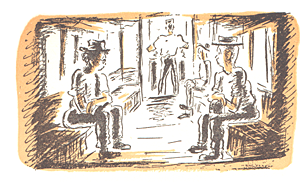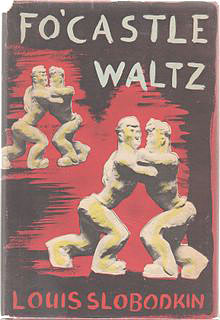|

R A I S O N d’ E T R E
Now, why should a fat, soft guy with glasses be waiting for (believe it or not) a Brooklyn streetcar at six o’clock on a brilliant, hot July morning? That’s what I asked myself as I leaned against a cast-iron lamppost still warm from yesterday’s sun. And as I idly squinted up the sun-slashed street I found my answer in the fear-widened eyes of a flapper kitten who had backed herself into the corner of a building as a protection from a lecherous old tomcat.
There were many answers why I was taking the trolley, if it ever came along, to that Bay Ridge dock to board the freighter, the S.S. Hermanita. For one, there had been some dame. I knew that wasn’t the real reason for sticking my neck out. I had no feeling left for her; for these past six months I’d been stretching my emotional concern. Besides, I’d been reading a lot of Conrad and Melville lately that should have acted as an antidote for this kind of adventure—the men I’d read about were hard, competent people, hardly my type of schlemiel.
The pitiful mewing of the virgin kitten with her backside wedged into that corner of the red-brick wall reminded me why I was starting on this hunt for the S.S. Hermanita and adventure.
She was so much like the thin young cat who had walked into Old Man McQuarrie’s studio the winter before. She, too, had had the wide blue eyes of innocence and virginity. The old man had ordered her fed, and for a few days she lived the luxurious life of a pampered darling—as much pampering as she could get in the busy, architectural-sculpture studio where I’d worked that winter. The old man (he was about fifty) was very concerned that all studio windows be locked fast at night. It was not that he feared ordinary marauders. What could you steal in an immense studio full of large clay models, plaster molds, and miscellaneous sculpture paraphernalia? No, it was the kitten. He’d taken it upon himself to protect her honor from those unscrupulous brigands, the alley cats, who prowled our roof on moonlit nights—or perhaps to save her from her own moon-madness.
But one night the skylight window had been left open. Our little cat did not appear at the studio until late in the morning and then—with her sleek fur ruffled and a world-weary expression on her dainty little muzzle—gone were the blue eyes of virtue; they had changed overnight into a wise, calm gray. Unquestionably, our pampered little darling had been put. She’d gone over that fence from which there is no returning. The kitten had become a cat.
Seemingly, all that has nothing to do with my looking for trouble aboard this tram, the S.S. Hermanita. But when our cat returned, the old man looked at her sharply over his shoulder and then through his teeth told one of the studio boys to put her out.
We all felt bad about it, but no one protested. Later that morning there had been a bit of talk about the relative merits of England and France. The old man had spent some three weeks drunk in Paris and no time at all in England. He talked with authority of the superior qualities of England, and his yes-men, working on the clay panels alongside him, yes’d Mr. McQuarrie’s every preposterous statement. I don’t know whether it was the rankling resentment I felt about the injustice done the cat or irritation at the old man’s pomposity, but I broke into the conversation with an impassioned defense of France. All I’d ever read, all I’d seen of her art and heard of her music, women, perfume, wines, food, went into my argument for her superiority to the cold-mutton, horse-faced women and blunt men of England and their culture.
The old man turned his head slowly, eyed me coldly, and asked, “Slobodkin, where have you ever been?”
I’d given some weak reply ... I’d read, seen the work, and heard about ... but it was true, I’d been no place. I’d been as far north as Lake George, as far east as Long Island, west to Madison, New Jersey, and south to Staten Island.
Well, there I was waiting for the streetcar that would take me to a ship bound for the Argentine, six thousand miles away—farther away than any of that dreary bunch had ever been—far enough away so that I could argue about any place when
 I came back and no one could cut me down with a “Where have you been, Slobodkin?” again.
I came back and no one could cut me down with a “Where have you been, Slobodkin?” again.
It strengthened my resolution to think back, and in gratitude I shied a chunk of brick at that growling old tom and sent him scurrying. The rescued kitten scampered in the other direction with her honor intact for one more day, or until I’d boarded that trolley which lurched off down the street, looking for the S.S. Hermanita and the other end of the world.
. . . .
|


